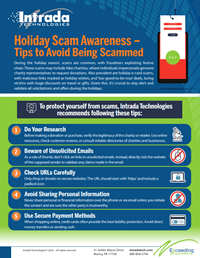Email: we may love it, hate it, or fall somewhere in between, but we all know it. The opaque system of servers, addresses, and distribution groups enables the familiar game of corporate tag around which so much of our life depends. I can’t tell you how many tickets I’ve dealt with concerning email: ...
Holiday Scam Awareness


During the holiday season, many scams crop up, aiming to exploit individuals' festive spirits. Some of the most common scams include fake charities, where scammers pose as representatives from genuine charities to solicit donations. This topic has gained significant attention due to the ongoing conflicts in Ukraine and Israel. Another popular scam is the holiday e-card scam, where cybercriminals send emails with malicious links disguised as holiday greetings. Additionally, the 'too-good-to-be-true' holiday deals are another prevalent fraud, where scammers offer unrealistic discounts on travel or gifts to lure unsuspecting victims into revealing their financial information. Therefore, it is essential to remain vigilant and confirm the credibility of any solicitation or offer received during the holiday season.
To protect yourself from scams, follow these tips:
- Do Your Research: Before making a donation or purchase, verify the legitimacy of the charity or retailer. Use online resources, check customer reviews, or consult reliable directories of charities and businesses.
- Beware of Unsolicited Emails: As a rule of thumb, don't click on links in unsolicited emails. Instead, directly visit the website of the supposed sender to validate any claims made in the email.
- Check URLs Carefully: Only shop or donate on secure websites. The URL should start with 'https' and include a padlock icon.
- Avoid Sharing Personal Information: Never share personal or financial information over the phone or via email unless you initiate the contact and are sure the other party is trustworthy.
- Use Secure Payment Methods: When shopping online, credit cards often provide the best liability protection. Avoid direct money transfers or sending cash.
- Confirm Changes to Accounts: If you receive an email requesting changes to your account, personal, financial, or social media, you must confirm this directly with the person or organization. Do not click on any links or follow any instructions provided in the email. Instead, find their contact information through official and credible sources and call them. This step allows you to verify the authenticity of the request, thereby avoiding potential scams.
Note: It's important to remember that Intrada operates with users' security as a priority. Therefore, should there be any upcoming changes to network configurations, Intrada will always send out a communication related to these changes before the actual email. This will help users to be informed ahead of time about any modifications affecting their security or account. This practice is part of Intrada's commitment to ensure the highest level of protection against scams and cyber threats. Stay alert, stay informed, and always confirm any changes directly with Intrada through the HELP DESK or call the office.
The most common scams during holiday seasons typically fall into a few categories:
- Fake Charities: These scams feature fraudsters pretending to be representatives of genuine charities, asking for donations. They often use emotional appeals and create a sense of urgency to compel people to donate.
- Holiday E-Card Scams: In these scams, potential victims receive emails that appear to be holiday greetings. However, these emails contain malicious links or attachments that, when clicked or opened, can infect the recipient's computer or device with malware.
- Too-Good-To-Be-True Holiday Deals: These scams offer unrealistic discounts on travel, gifts, or other items. The goal of these scams is to entice victims to provide their financial information under the guise of purchasing an item or service.
- Account Change Scams: These scams involve emails asking recipients to change their personal, financial, or social media accounts. The scam aims to trick people into providing their login credentials or other sensitive information.
Remember, the best defense against these scams is staying informed, vigilant, and skeptical of any too-good-to-be-true offers.
The adage, "If it seems too good to be true, it probably is," holds particularly true when dealing with potential scams. Unrealistic offers and promises are often used as bait by fraudsters to lure unsuspecting individuals. These scams capitalize on the excitement and haste that typically accompany what appears to be a "once-in-a-lifetime" opportunity. However, it's crucial to approach such offers with caution and skepticism. Scammers are well-versed in exploiting human emotions and enticing victims with seemingly irresistible deals. Always slow down, think critically, and thoroughly investigate any offer before parting with your hard-earned money or personal information. Trust your instincts and remember that if an offer feels too good to be true, it most likely is a scam.
If you received an email in question, contact the HELP DESK to have the email confirmed to ensure it is a valid email. Never change any account information without confirming using a different form of contact like a phone call or letter.

Cybersecurity Awareness Poster
Intrada Expands Invoice Payment Method Option...
AtIntrada Technologies we are always looking for opportunities to innovate and make things easier for our clients. We are pleased to be partnering with WisePay and Global Payments for all Direct Debit payments and we would like to offer you the option to pay your invoices via bank account or credit ...
Contact Us
- 800-858-5745
31 Ashler Manor Drive
Muncy, PA 17756
Office Hours
Monday - Friday
8 AM - 5 PM EST
Intrada Technologies


Copyright © 2025 - Intrada Technologies - Privacy Policy and Disclaimer
Our website uses cookies and analytics to enhance our clients browsing experience. Learn More /

